Honor Porter, honor myself?
[I’m putting off an announcement of my Armitage birthday charity plan another day. Signs were in evidence today someone was trying to hack, or at least prank, this site.]
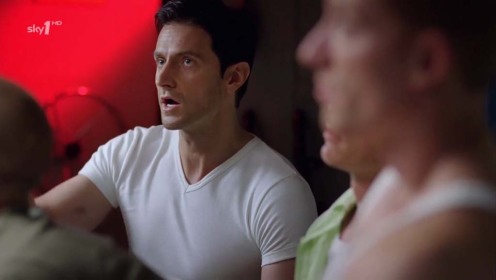 John Porter (Richard Armitage) asks a question at the pre-mission briefing for the Bratton extraction in Strike Back 1.1. Note the bruise on his arm. Source: RichardArmitageNet.com
John Porter (Richard Armitage) asks a question at the pre-mission briefing for the Bratton extraction in Strike Back 1.1. Note the bruise on his arm. Source: RichardArmitageNet.com
Third day of new faculty orientation. Only four days here, as opposed to five at my last position. Orienting faculty is always like herding cats — most faculty tend to see it as an extended bombardment with information that we will never need. It’s interesting how notions of professorial privilege persist, explaining the hesitancy with which administrators even tell us that we are legally required to attend certain sessions or do certain things in the classroom. Here, we get an actual checklist of things we’re required to do as conditions of employment, as well as a list of things we can and cannot use university computer resources for, practices still a bit unusual in the university world. The people conducting the orientation know we don’t want to be there but, beyond briefing us as to our responsibilities, use the time to try to convince us how much they love us, how much they want to support us, and what a great institution it is that we’re joining. They teach us the campus fight song, because they want us on the team.
Orientation always unmasks the fundamental worries of an institution. In my last position, they were clearly anxieties about institutional reputation. Orientation events focused intensely on how the institution was going to require us to prove in every way that we were worthy of working there, right down to a session devoted to explaining the hierarchy of parking place distribution. The message: keep looking out for number one because the only way to really merit inclusion in the team was to be better than everyone else. Maybe, after years of proving ourselves, we’d get to join. The university didn’t teach us the fight song, the alumni association did, at an optional luncheon, and even they were a bit apologetic, as if they already knew better than we that most of us would never sing it except with embarrassment, at commencement. Here, the bottom line concern is less about faculty prominence than about student academic progress and behaviors. We should join the team now in order to help our students, make our working environment pleasant, and be socially responsible members of the larger community. I like the tone of this orientation a lot, and though it’s not yet quite enough to sell me on continuing in the profession, I grudgingly acknowledge that it’s possible to set a different tone at a public institution than the one cultivated at my last job. Maybe this institution, unlike my last one, will refuse to join the interminable chorus in the media about parasitical professors as poster children for the problem of the lazy public employee. Maybe.
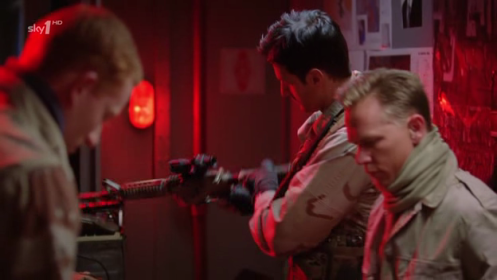 John Porter (Richard Armitage) equips himself for his upcoming operation in Strike Back 1.1. My cap.
John Porter (Richard Armitage) equips himself for his upcoming operation in Strike Back 1.1. My cap.
Meanwhile, there’s a lot of information to assimilate before we can sit down to that vital task of writing syllabuses. Every campus has its own little quirks, its own special tools for navigating the term. The new faculty present groan when we hear about an annoying requirement or murmur appreciatively when we learn of something helpful. The campus where I took my first tenure-track job had a neat little form headed “drop student at request of instructor,” a nice lever in the hands of the responsible faculty member who could use it to compel all kinds of cooperation. My new campus drops anyone who doesn’t attend the first day of classes, an unmitigated support for our work that colleagues at my last campus could only dream of, but it means (gasp) that we actually have to “call the roll” at least once, something I haven’t done in a decade, not out of laziness, but because it had no purpose. I’m amused. I approve.
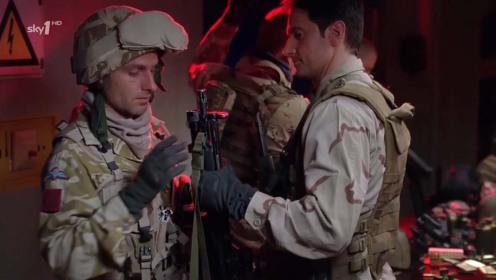 John Porter (Richard Armitage) hands Hugh Collinson (Andrew Lincoln) the weapon that will end up destroying them both, in Strike Back 1.1. Source: RichardArmitageNet.com
John Porter (Richard Armitage) hands Hugh Collinson (Andrew Lincoln) the weapon that will end up destroying them both, in Strike Back 1.1. Source: RichardArmitageNet.com
Later, presentations and discussion turn to the way that FERPA is applied on this campus, a topic with which I have a long, tortured history. Intriguingly, we were told that strict adherence to the letter of the law requires that we not even acknowledge to parents that a student is enrolled in one of our classes. In five faculty orientations, that’s the first time I’ve heard that claim. I’m particularly fascinated by the rules for waiving the privacy barrier, and become rather involved in the discussion. And, despite trying desperately to stay out of the fray, despite repeating to myself like a mantra every fifteen minutes that this is a job I need to do with the maximum of dispatch and the minimum of emotional involvement and I emphatically do. not. care., I get involved. I want to be that adjunct faculty member who’s figured out how to protect herself against exploitation of her altruistic sympathies, but I’m not that person (and honestly, I haven’t met many people to whom that description applies. On the whole, even the exploited faculty care about what they’re doing). I don’t really know how not to care, and that’s been part of the problem all along. So I ask questions. I take a position.
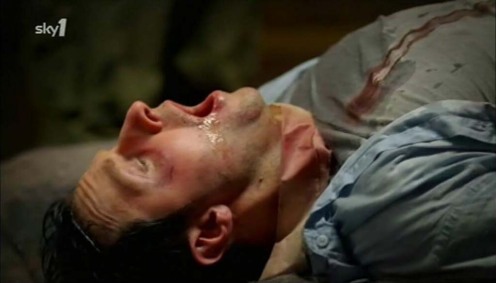 John Porter (Richard Armitage) during a waterboarding session in Strike Back 1.2. Source: RichardArmitageNet.com
John Porter (Richard Armitage) during a waterboarding session in Strike Back 1.2. Source: RichardArmitageNet.com
 John Porter (Richard Armitage), in pain after being shot by the tsotsis in Strike Back 1.4. Source: RichardArmitageNet.com
John Porter (Richard Armitage), in pain after being shot by the tsotsis in Strike Back 1.4. Source: RichardArmitageNet.com
And then, fully unbidden, the Porter fantasies start, the stories generate themselves in my head. They’re not much fun — paying attention to orientation would be better. They start out from canonical stories and get worse. Porter, the prisoner of war, cringing in a corner as violence is threatened, passing out as his molar is twisted out. Porter in a hospital bed, attached to various beeping monitors. Porter, defendant at a court martial. Porter, eyes big, appealing to me not to let him be dishonored. What I can do in any of these scenarios is unclear, as I’m outside the frame of the story in every one of them. His constant plea: don’t let them hurt me or take away my honor.
 John Porter (Richard Armitage), as he listens to Hugh Collinson tell him all the reasons that his honor is irretrievable, in Strike Back 1.6. My cap.
John Porter (Richard Armitage), as he listens to Hugh Collinson tell him all the reasons that his honor is irretrievable, in Strike Back 1.6. My cap.
A year ago this would have mystified me and annoyed me — why I am thinking about Porter, and in this case, wounded, dishonored Porter, just when something’s become very interesting? I think if I were bored, I’d be having sexual fantasies — something that really lightened the tedious flood of information, something that really entertained. I have more sexual fantasies about John Porter than about another character Mr. Armitage has played. Instead, just when I get interested, I get these visions of physical and emotional carnage.
 The Porter fantasy I’d rather be having during boring meetings: John Porter (Richard Armitage) dreams of Danni (Shelly Conn) in Strike Back 1.3. Source: RichardArmitageNet.com
The Porter fantasy I’d rather be having during boring meetings: John Porter (Richard Armitage) dreams of Danni (Shelly Conn) in Strike Back 1.3. Source: RichardArmitageNet.com
If my fantasies about Porter are a way of listening to myself, if Porter is another piece of my self, talking to me, then I think he’s telling me that these sessions risk crossing some boundary that’s important to me but whose importance I can’t fully acknowledge. One problem with my brain has always been that I can be interested in everything. Unfortunately, my absorption with things frequently masks my feelings about them — a tendency that the dominant strands in my childhood and adult education both fed, for different reasons — both taught me to enjoy evaluation and eschew feeling. I tend to overuse that capacity in ways that harm me, and I can be angry without really realizing it at all, or find myself betrayed only after it’s much too late to do anything about it. So I’m trying very hard to pay attention to the fantasies that appear in particular situations because I’ve started to think that they may involve my psyche signaling to me things that my reason or my moral commitments disallow as conscious or rational statements.
 John Porter (Richard Armitage), who believes the false story that Hugh Collinson (Andrew Lincoln) is telling about him, in Strike Back 1.1. Source: RichardArmitageNet.com
John Porter (Richard Armitage), who believes the false story that Hugh Collinson (Andrew Lincoln) is telling about him, in Strike Back 1.1. Source: RichardArmitageNet.com
So as my mind becomes caught in the convolutions of FERPA — did you know that some uses of anti-plagiarism software may also violate the law? –, my brain gets preoccupied with Porter fantasies: Porter wounded, Porter afraid, Porter submissive, Porter beaten. All these wounds coming from his perception of dishonor. So it came to me this afternoon, the explanation. Not that it makes me feel all that much better. There are three problems.
If I were honest — and if I say these things, I may have to punish myself like Dobby, because this is heresy in the academic world, which considers itself the upholder of everything true, fine, and beautiful — or failing that, better than the other options available to the thinking person — for most of the years I’ve been an academic, I’ve experienced the academic world as a location of betrayals, large and small. For the last two decades (it’s exactly two decades, this fall, since I started graduate school) I’ve devoted myself to a grand idea — that looking for the truth, elusive as it always is, and difficult to grasp — is the greatest of end of humanity; and that there’s a second corollary to this end, which is that once established, no matter how provisory our awareness of the truth, what we know must be passed on, that through the passing on, the truth is refined and made real for wider groups. Universities were sold to me as places where these two great activities were prioritized. And of course, everyone in a university will tell you that’s still true, and it’s probably true for some of the people who work there. But in so many places, and indeed in everyone in which I’ve worked, the search for truth has mostly been subjugated not just to the ubiquitous and petty human sins of jealousy, envy, power manipulation, and so on, but also to the much more mundane pressures of politics, careerism, and striving after wind in the service of the almighty dollar. And teaching: I shouldn’t allow myself to say anything about this for fear of overwhelming you, but I’m afraid that so little gets learned in some situations that it’s frightening, that we worsen the very ills we seek to cure as professors. I can’t point fingers at others or claim that I’m untainted, as I was just as much occupied with these tendencies as anyone else. So I’m left with the idea that I want to do the most important thing — but that the place that most advertises itself as holy is not simply profane, but increasingly loathsome.
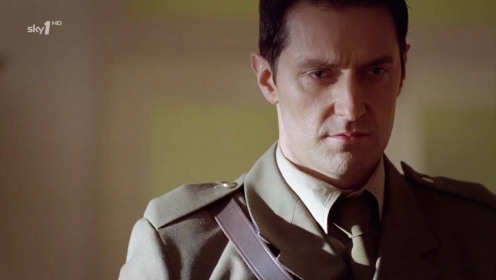 The end of honor comes when you can no longer honor yourself: After being praised for refusing to defend his actions, and informed that his comrades no longer trust him enough to work with him, Porter (Richard Armitage) concedes that he wouldn’t work with himself, either, in Strike Back 1.1. Source: RichardArmitageNet.com
The end of honor comes when you can no longer honor yourself: After being praised for refusing to defend his actions, and informed that his comrades no longer trust him enough to work with him, Porter (Richard Armitage) concedes that he wouldn’t work with himself, either, in Strike Back 1.1. Source: RichardArmitageNet.com
If only it were that easy — just making the decision to leave the profane for the holy, wherever one could find it. But the participation in the institution does more to you than just betray you. It has to make you complicit in your own destruction. The Hugh Collinson type is all too familiar to me, in other words: people involved in spinning huge paeans to the emperor’s new clothes that result in careerist, self-protecting statements that end up being outright lies. And sometimes the lies are about you. The second problem is thus that when you believe in the institution, you end up being tempted to believe the stories that it tells about you. Porter didn’t see what happened, and so when he’s told that it was his faulty decision-making that brought disaster to the mission, he begins to doubt himself. That’s problem number two for me, and why I’m so afraid of being betrayed: because betrayal doesn’t just involve failure or disgrace or whatever negative consequence, it also involves me having to accept certain stories about myself. The struggle to remind myself that the stories that are being told about me are not real is exhausting and frustrating. What people say happened to met in my last institution is just that: what. they. say. I have to fit into their narratives so they can continue their vision of an institution as the protector of the true and the beautiful. In order for that to happen, in their stories, I have to be at fault. It can’t be the Hugh Collinsons of the world who take responsibility for their decisions in the way that they’ve forced me to take responsibility for mine.
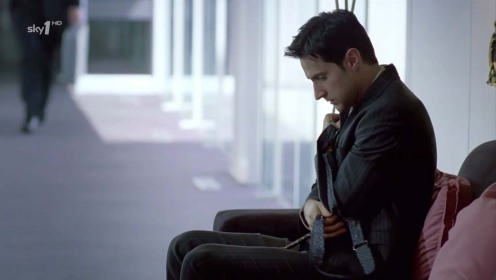 John Porter (Richard Armitage) steels himself to look for another job as he leaves the regiment, pulling off the arm support in order to appear stronger, in Strike Back 1.1. Source: RichardArmitageNet.com
John Porter (Richard Armitage) steels himself to look for another job as he leaves the regiment, pulling off the arm support in order to appear stronger, in Strike Back 1.1. Source: RichardArmitageNet.com
Which brings me to the last problem, and the reason that Porter becomes such a potent fantasy for me in these settings: despite the first two problems, there’s no way out. I can’t make myself into the careerist, just like Porter can’t make himself into a bean counter or a private security person. Doing the work well is about believing, believing in the goal, believing in the institution, and in the end, about believing in the thing that one is.
 John Porter (Richard Armitage) as what he really is: Leading the Bratton extraction in Strike Back 1.1. Source: RichardArmitageNet.com
John Porter (Richard Armitage) as what he really is: Leading the Bratton extraction in Strike Back 1.1. Source: RichardArmitageNet.com
Everything else you do is just something to keep a roof over your head.
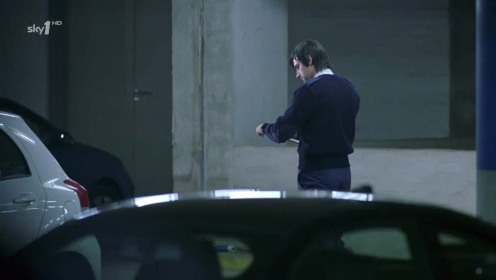 John Porter (Richard Armitage) working in the MI-6 car park, in Strike Back 1.1. Source: RichardArmitageNet.com
John Porter (Richard Armitage) working in the MI-6 car park, in Strike Back 1.1. Source: RichardArmitageNet.com
The problem, and this is why I think the Porter honor fantasies are so powerful for me, is that Porter never found a way out that didn’t involve precisely the institution and the people who betrayed him. He never walked away; he kept believing in the idea that motivated him in the first place, he maintained the identity on the shoals of which he’d washed up during the failed Bratton extraction. He fixated on the thought of his redemption even when he didn’t know how it could be achieved — collecting his wits for all those years and working out, waiting for the chance to reinsert himself. I wonder if I have that much stamina I sit in faculty orientation, wanting not to believe — and yet realizing that believing — and navigating the inevitable betrayals — are the only paths back to redemption. I have to risk further self-destruction if I am to have any hope of reconstructing myself as I understand myself. The only other option is total self-abandonment — but that’s not really an option, either. I just don’t know if I have the strength.
It’s no wonder Porter is screaming to me to watch out just at the point when I’m most involved, concentrating the hardest, doing the thing that I believe is most right. Because it’s at that point — the point of intoxicating loss of self-awareness that occurs in intense commitment — when the betrayal starts. Involvement is the only way to solve the problem, but it’s precisely involvement that’s the most dangerous step to take.
Join the team — at your own risk. I want to trust this place. On some level I have no choice. If only I could.




Wow. Good luck with walking the tightrope. I also find Porter very ennobling and fascinating, and I can see how his strength and compassion can help you (and me) survive the day-to-day challenges. Fight the good fight. And I’m still an optimist. I believe that there is good to be done, even in the midst of an evil bureauocracy. Unless you’re part of an intellectual Soylent Green.
LikeLike
Thanks, b6ft. I think part of the key for me is realizing from the start that I am not going to change anything about the bureacracy and that there’s a reason it is the way it is that is much bigger than my capacity to affect it. I do think one can affect the success of individual students.
LikeLike
Nice comparison between Porter´s bureaucratic career and yours (ratio). Listening to your (day) dreams does help…
LikeLike
It really does help.
I am wondering these days whether my life would have been different if I’d taken my daydreams more seriously for the last 2-3 decades instead of always writing them off, first for moral reason and then for intellectual ones.
LikeLike
As a parent currently paying for one (soon to be two) college educations, these sorts of posts always disturb me. I applaud you for your honesty, but then I start to wonder exactly what I’m paying all that money for. I would like to think all professors are honest and altruistic in their profession, but are they really?
LikeLike
What you’ve just said is one reason why we’re not supposed to talk about institutions and how they really are — because we undermine the product in the eyes of the public if we admit that not everything about the university is true, beautiful, and good. That’s one reason, anyway.
Professors are probably honest and altruistic in the same ratio as GPs (for example), less altruistic than public defenders or middle school teachers and more altruistic than personal injury lawyers and hedge fund directors. LOL. I mean, professors are people, too. Here are some big generalizations: one thing that typically separates a professor from a primary or middle school teacher is interest in the subject as such and willingness to spend another seven years or so researching it before being able to take a full time job. The “better” the university, the more that will be the case. On the whole, that’s thought not to be bad because college students are supposed to be capable of supervising their own learning rather than needing to be taught how to learn. (In my experience this is no longer true in the way it was a decade ago, but that’s the assumption along with the university runs.) You should also know that at the vast majority of public universities in the US and many of the private ones, raises are given only for publication and often only for certain kinds of publications. There’s no cost of living raise and often no premium for teaching well outside of periodic teaching awards. At such institutions it’s always in the interest of the faculty member to prioritize research over teaching. That doesn’t mean that there are no good teachers in such places, just that it pays for their concentration to be elsewhere. People who focus on their teaching in such situations are true altruists insofar as they are taking a pay cut in order to do so. I had both a strong research record (I had to — the starting salary was below the poverty line for a family of four in my community, so I had to write just to try to catch up with the middle class) and a strong teaching record, BUT I was never going to win a teaching award because my classes were thought by my colleagues to be too difficult and I was said to grade too hard. (The average grade in my class was 2.9, about a half a point below the mean in my department, and the average student satisfaction rating was 4.5/5, well above the mean of 4.2, but the awards went to people with 4.7 or 4.8 satisfaction). I was told in writing on my final teaching evaluation by colleagues that I would be winning teaching awards if I made the classes easier so that I could give higher grades (and my institution had a whole office tasked with combating grade inflation). Note that none of the discussion of how good a teacher I was was related to student outcomes. That’s really frustrating to me and it should be to parents as well, but universities are going to fight formal outcomes evaluation to the teeth because of how it’s turned out in public high schools: scantron tests and NCLB.
Since you have been through this once already, you probably already know most of this, but If I were shopping for a post-secondary institution, I would focus on a few things. Note that I’m thinking here in terms of quality of education, not necessarily employability afterwards (if that’s your main priority, then the “sticker” of prestige attached to certain institutions will be of greater importance to you than it was to me — I went to a noname insititution where they really taught me something.) Teacher/student ratio (not faculty/student ratio); average class size in upper- division classes (ideally, 15 or below, and yes, you can get that ratio easily in many public universities); amount of work done by students (in the humanities, average number of pages written and graded per class; in the sciences, number of lab hours) — for this you need to look at actual syllabuses — in the humanities students should be writing at least 25-30 pp per semester and reading a minimum of 100 pp a week to prepare for class; percentage of lower division classes taught by tenured or tenure-track faculty (not grad students or adjuncts, who often have reasons to be less invested); opportunities to participate in faculty research or faculty-supervisied research and concrete info on how many students do this (is it just the poster children in the alumni magazine or do a lot of students do it?); extent of faculty-student contact outside of class in clubs, etc. Are the faculty making time-intensive assignments, perhaps some that involve group work, or are they obviously assigning work that’s simply easy to grade? Finally, what’s the average number of hours a student works per week at the campus? This is important even if your child will not be working, because the availability of students to congregate outside the classroom contributes to the intellectual culture of a place. Because of student evaluations professors other than me have become very sensitive to what the traffic will bear in terms of work.
Finally, accept that there are bad apples in every barrel but that a bad apple also infects a barrel. If your student finds a particular faculty behavior problematic or troubling, is that just that particular professor? Or is it a pattern on campus? If it’s a pattern, maybe time to move your student no matter how much s/he likes his campus. There are also behaviors to encourage in your student that can improve outcomes. S/he should try to ask a question during every class period. S/he should introduce her/himself to the professor at the beginning of the semester in office hours. S/he should go to office hours to discuss assignments. Frankly, in an atmosphere where it’s a struggle for me to remember everyone’s name, I am always more invested in the success of someone I know.
FWIW.
LikeLike
Oh, Serv, I wish I could somehow conjure up the perfect thank-you gift for this post! Since I can’t magically place John Porter on your doorstep, this will have to due. And frankly if I could magically place John Porter on a doorstep, it would probably be mine and you’d just have to come visit.
I’ve got a child currently looking at universities (she will be starting in Fall 2012) but has no idea of the career path she would like to pursue. So we’re sort of floundering around, since her only criteria at this moment is that she does not want to live at home (i’m trying not to take that personally – LOL!!)
I’m going to be referring to your response as we continue our search, since I now feel that I at least have an idea of the appropriate questions to ask. Hopefully the information that I would like to evaluate will be readily available, but I’m doubtful. In my experience with my older child, the state university she attended was not incredibly helpful. She is an education major, getting ready to start applying for jobs and I think she will do ok (God and the economy willing). My little one, however, is a clean slate and I would like to learn from my previous experience and guide her with more knowledge that I had four years ago.
So, a huge thank you for all your help, and for your informative posts. I hope I did not sound like I do not enjoy hearing about your career, because I do. It’s interesting to see the professor’s side of things, it’s like being exposed to a whole new world. Sometimes that world does not seem so terrific, but I guess that’s the reality of life. Another justification for having John Porter around!
Good luck in the new job. I wish you all the best.
LikeLike
If you want we can talk more about this privately — I wouldn’t worry too much about your daughter wanting to leave home. That can be a good sign, right? (I was absolutely dying to leave home at 18 and in fact moved 1400 mi away.)
Some of these statistics will be easily available (student to fac ratios) while others will be hard to come by. Make sure she attends a class or classes at the campuses she visits. There are many good public universities, but I think they tend not to be the flagship campuses, or perhaps, rather, the big flagship campus is good for a certain kind of student. There are also private universities that are probably a waste of money. The key, once you’ve established that the education you’re buying is sufficiently rigorous, is matching the student to the campus. My brother would have gone crazy at the liberal arts college I attended; I’d have floundered at the branch campus public university he attended.
And no offense taken. If I say something controversial I except to have to explain myself. I always enjoy talking to you.
LikeLike
I’m not upset she’s leaving home, in fact I encourage her to live on campus and experience college life to the fullest, at least the legal parts. I just wish she wouldn’t make it sound like she’s currently living in the seventh circle of hell. She has a nice life at home, truly she does!
And I probably will take you up on your offer to speak privately later. I’ll pin her down with a few choices first and then start research.
Thanks again!
LikeLike
I truly liked this post. I also work for an organization that claims to uphold truth and beauty. Honestly, its aims are noble and its cause is worthy. But the reality can be so different from the printed ideal that it makes me sad. If you point this issue out, then you are the problem. I sometimes feel hypocritical because I’m forced to toe the party line, even when I know from personal experience it isn’t accurate. Still, in order for me to do ‘the right thing’ in my own eyes I have to remain with this organization.
I really appreciated what you wrote at the end. It gave me momentum, just when I needed it.
“Porter never found a way out that didn’t involve precisely the institution and the people who betrayed him. He never walked away; he kept believing in the idea that motivated him in the first place…. He fixated on the thought of his redemption even when he didn’t know how it could be achieved…. I wonder if I have that much stamina I sit in faculty orientation, wanting not to believe — and yet realizing that believing — and navigating the inevitable betrayals — are the only paths back to redemption.”
You have to have faith in the idea, even when the reality lets you down. I hope you and I both have to stamina to navigate through the betrayals and believe in the end results.
LikeLike
Thanks for the sympathy, dorcas! You know six months ago I was convinced the only way was to go, and now I’m worried about being seduced away from that conviction. Don’t know if I should have taken this job, but you’re right, if one feels compelled to believe in the idea, one has to accept that reality is usually much messier.
LikeLike
Hi Servetus,
I feel your pain about any university’s acculturation of new faculty–with the deadly and boring orientation meetings or week. Yikes! Maybe universities should do a better job of “wooing” their new faculty like a lover seducing a virgin–nurturing these new faculty along, enticing them with travel budgets or release time, inviting new faculty to inner sanctum gatherings where they can share their fresh ideas and have them truly listened to–until they capitulate into compliance and conformity willingly. Or into complicity? Ha! Sorry, I write love stories, so my analogies tend to involve romantic images.
But, I really do think universities need to stop the well meaning “cookie cutter” approach to faculty development. I’m a staff person at my university and our faculty who attend faculty development activities bemoan that these sessions only contained half of what they wanted. The other half was probably what a different faculty member wanted. The faculty just don’t want to have to sit through presentations or discussions that they’re not interested in.
So, hang in there. You’ll be able to pick and choose which faculty development activities you want to attend in the future. And if you can’t beat them, join them and suggest presentations and discussions that you would like to attend–and then lead those activities.
Cheers! GratianaDS90 ;->
P.S. Oh, and our advisors group that I belong to has merrily decided that we all need an update on FERPA. Ha!
LikeLike
Faculty are also hi-tech whiners, I will admit. We can come up with a rationalization for just about any position we take. Don’t waste my precious time — I am so smart and the rules that apply to normal people don’t apply to me! I surely don’t ever want to be like that. I don’t know what the solution is. There’s some information I need to know that I’d rather not spend three hours learning, but that doesn’t matter — our campus’ policy for grade disputes, for example. One thing I discovered this week is that some of the sessions i skipped (Blackboard, for example: I’ve been using it for over a decade) had information I could have used, but they were poorly labeled. It’s fair for campuses to say: people are standing in line for your job (which is true) and why should we baby you? Grow up. Or: walk in our shoes for a year or two before you start criticizing how we do things. I’m sure no administrator wants to hear from someone who’s been on campus for 24 hours how much better it is elsewhere. On the other hand, the best way to keep people involved and committed is to show them that their contributions makes some difference. I do like your romantic imagery.
FERPA: a topic of endless fascination. Seems like the rules / interpretations keep changing.
LikeLike
[…] uncertain whether this was the right decision, even up to the night before work, even through the first week. I still waver. But things are so different here. I still don’t whether this will have been […]
LikeLike
(partially) OT: A positive tumult « Me + Richard Armitage said this on September 8, 2011 at 1:02 am |
[…] Exit from bondage. My parents are both still with us. An expected job offer that turned out to have created a place of healing for me that I couldn’t have imagined. Revelations about what G-d wants for […]
LikeLike
Thanksgiving in a strange place « Me + Richard Armitage said this on November 24, 2011 at 12:11 am |
[…] everything bad that could have happened in a situation like the one I’ve put myself into, I’m actually optimistic about the new campus, but I’m still leary about the career, how …. Teaching is not the worst part of the knot I’ve tied myself into, but it’s one piece, […]
LikeLike
me + richard armitage relics « Me + Richard Armitage said this on June 16, 2012 at 5:08 am |
[…] I think it’s that I’ve in general figured out, during the many hours when I couldn’t write this summer, a rough trajectory of where my connection to Armitage’s roles fits in my own odyssey. In addition to what I say about Richard Armitage, I write mostly about four characters here: Mr. Thornton, Guy of Gisborne, Lucas North, and John Porter — who appeared in a magical trail for me during about the first five months of Armitagemania. Thornton was about work — I’ve started, and almost finished delineating that; Guy is about power and powerlessness — and I am starting to be able to deal with that in detail verbally now; although I’ve never written about it in much detail, Lucas was about processing trauma, which is why his eyes graced the header for so long; and Porter, whom I’d also like to write more about, was about the possibility of vindication vs destruction. […]
LikeLike
Cathecting to Oakenshield? or, a not-so-brief etiology of Thorinmania — ONE « Me + Richard Armitage said this on September 2, 2012 at 5:01 am |
[…] whose story has meant so much to me — as hero or heroic archetype, as shamed failure, as figure of the search for vindication, as worker-out of trauma, as cheerleader, as father, as wash and wear soldier-type, and infinitely […]
LikeLike
The first time ever I saw John Porter | Me + Richard Armitage said this on October 24, 2013 at 7:50 pm |
[…] to this city, in the middle of a shower, and then sitting here, in this café, the morning before I went to new faculty orientation, the hopes I had, and the sometimes inexplicable tears back then, which were about the wake of the […]
LikeLike
The furniture’s gone | Me + Richard Armitage said this on May 29, 2014 at 12:53 am |